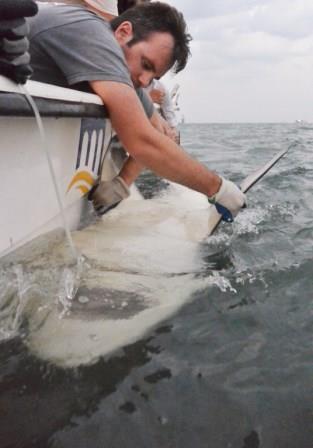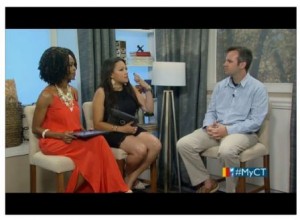Posted Tuesday, Aug. 11, 2015
Chuck Bangley is a North Carolina Sea Grant-funded doctoral candidate in coastal resources management at East Carolina University. He blogs at Ya Like Dags and tweets from @SpinyDag.
NOTE: On Thursday, Aug. 13, Bangley will be in Raleigh to discuss his shark research. His talk will be at the Daily Planet Cafe in the N.C. Museum of Natural Sciences. The event begins at 7 p.m.

Chuck Bangley handles a bull shark that was caught. Photo by Cecelia Krahforst
Shark research is one of those rare scientific fields that readily lend themselves to media coverage. As large, charismatic and potentially dangerous animals, sharks create a natural interest among the general public that extends to the people who work with them.
Even the fact that shark research is occurring can attract media attention. This is the kind of media coverage scientists always want — a focus on the research itself because it’s interesting to the general public. The researcher gets validation for what he or she is doing. In an age where just publishing academic papers doesn’t cut it anymore, media interest helps justify the grant money. Getting and holding the interest of the nonscientist public can help keep your research going.
Plus, for extroverts like me, working with the media actually can be fun. I have a great time getting reporters who ride along with us excited and fascinated by the work we do. I have had overwhelmingly positive experiences with that kind of press.
I think every shark researcher subconsciously knows that sooner or later they’re going to be the one who gets asked why a shark bite occurred. I usually use the term “bite” instead of “attack” because I feel that it’s a broader term that is usually more accurate and less inflammatory. And it’s only one syllable.
These interviews put us in the uncomfortable position of explaining how this animal we’re fascinated by — and that we try to get other people similarly fascinated with — hurt someone.
Instead of projecting how enthusiastic you are about your research, you now have to tread a fine line between keeping everyone calm and trying to make sense of the event so you can properly communicate your take on it in a helpful way.
On top of all that, you need to maintain a respect for the victims. Though you may know full well how low the odds are of a shark bite happening to someone, this traumatic and life-changing event actually did happen to them.
It seems overwhelming, but ultimately it’s one of our jobs as scientists to provide answers to people when they need them.
I was fortunate because my North Carolina Sea Grant research on shark habitats within the state’s sounds had received some media attention before this summer. Thus, I already had experience bringing news crews out on the water and traveling to give interviews when North Carolina’s 2015 streak of shark bites began.
As the bites kept happening, I still would find myself occasionally getting overwhelmed. On multiple occasions I would give an interview, only to find out immediately afterward that another bite had occurred — and suddenly I was flooded with phone calls and emails all over again.

Bangley appeared on “My Carolina Today.” Source WNCN
Strangely, aside from scheduling, there was never a point where I felt I was in over my head. I had answers to give people because I’d been tagging and sampling and analyzing data to figure out which sharks were in the area and when to expect them.
I could confidently make statements about topics such as the conditions under which someone could expect a bull shark to be in the area or why it’s a bad idea to swim near schools of actively feeding fish. I already had been collecting the facts to support my comments, albeit for reasons totally unrelated to bites on people.
I also was extremely careful to make sure I was only saying things I could back up, because too much conjecture can backfire in this kind of situation.
I don’t know if “expert” is the right word for it, but I felt helpful. And the media were needed to make sure the facts were getting out there, to prevent panic or an overreaction such as a shark cull.
I was not the only one providing commentary. Fortunately, in this case it seems that for the most part scientists and the media, at least the ones I talked to, worked together the way they should.
Read more about media coverage about the North Carolina shark bites in the Autumn 2015 issue of Coastwatch, to be distributed in September.